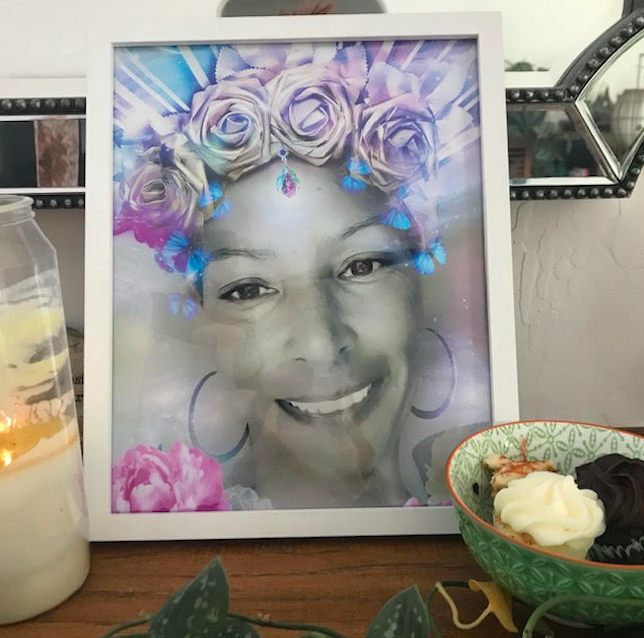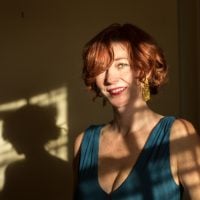Anxiety bubbles above this sinkhole of grief in my chest even though I thought I’d cried it out in the car.
As I walk through the cold, cluttered warehouse of Urban Ore looking for used doors, I imagine you walking beside me, wiggling in discomfort. You, the tidy, ideal houseguest, liked warmth and things in their place.
Missing you, I groan. Not just a sigh—more like my dog howling in her sleep. It’s loud enough for multiple masked men to look up from broken light fixtures and secondhand furniture to stare at me. “Life, life right now,” I mutter.
Announcing that you have just died seems like it would cross a line, even during this era of oppositions—more barriers but the removal of conventional boundaries due to Zoom and FaceTime. I’ve met all my clients’ pets and seen their bedrooms.
I’m spilling out at the edges when people ask me how I am. I pray that clients skip asking, “How are you?” because the question unravels me. When I say, “I just found out one of my best friends died,” people assume it was COVID-related and share their losses, offer air hugs, and say they wish they could give me a real one. Given how much you valued touch, it seems ironic that we must grieve without that comfort.
Until I found out you died, I was okay with quarantine, cultivating patience. There was the sense that I would see friends and family soon enough. I could be considerate of the collective, I thought, not travel, spend most of my days and nights alone.
Now I’m filled with an urgency to see loved ones. Allowing intentions to connect with friends to be brushed aside for a remodel, a writing project, and even a pandemic feels intolerable. If you’d told me you were dying, I would have gotten on a plane immediately. You didn’t want that, though; you never wanted to be a burden or disrupt peoples’ lives. Even though for years you have said, “I am not afraid to die,” I mourn the unsaid goodbyes. Selfishly, I wish I could have soaked in that last ray of love that you were, Jada.
I took your words for granted, assuming there would always be more. Now I wish I could go back and save every card and voicemail you ever gave and left me. Thank God for the Marco Polo videos I archived. I used to think keeping cards was sentimental and resulted in unnecessary clutter but now I don’t know how I will ever have the heart to throw them out, not knowing if it may be the last from another beloved friend.
You possessed a voracious curiosity. Your enthusiasm was contagious. You knew the magic of practice and had many rituals that were constantly changing. Inspired by the next way to heal yourself and others, you shared compelling arguments for why I should drink my pee to strengthen my immune system or use ozone-infused macadamia nut oil for my skin. There was already so much life in you. How could an ozone dental cleaning possibly make you any more vibrant, I would think, but you insisted it did.
Whether it was rife frequencies, acupuncture, or deep parasite purging cleanses, you had faith in your ability to heal and had the discipline to do it. During an altered state, you stretched your long leg, a black rope of licorice, above your head and kissed it, shouting, “This body is worth a million bucks. I love this body.”
You delighted in any food I made for you. Last night, I soothed my grief by cooking for six hours, working my way through the Ottolenghi cookbook. I saw your face while I fried onions for my lentils and rice, which along with garlic you stopped eating during a period where you followed an ascetic Buddhist diet. “No, belle, me no like,” you said. Hands pulled to your chest, you shook your head. I saw the four-year-old in you.
If you’d been my little girl, I would have cherished you and your tender heart. You, never wanting to harm any microorganism, even the tiny bugs that get squashed when root vegetables are unearthed.
~
Jada Delaney worked diligently to erase a legacy of sexual abuse as a child. She also internalized racism that formed foundational beliefs about herself as a Black woman and took a long-term toll on her body. Each person she offered care to was a practice in remembering to treat herself with the same degree of kindness. Maybe because she felt so unseen, she was excellent at identifying your goodness and then amplifying it so that you couldn’t help but see it too.
Jada wanted people to live their best lives and was always driven to support this evolution. Her gift in this lifetime came through being a skilled bodyworker. Jada touched everyone as if cupping a baby chick.
Jada’s study of Chinese medicine supported her desire to bring everyone into balance and harmony. She was attracted to self-reliant people and taught them they were part of a bigger ecosystem of humanity. She wanted to bring us back into wholeness with love.
There was an ancient wise crone in her as well as an innocent child, who squealed and giggled “Charna!” when I spoke crassly about sex. She called me Babe, Bella, Char Char, Charna-Belle, and said, “Oh Charn, Thank God for you” whenever I praised men under six feet with hairy chests as if my attraction to them was a good deed in the world. She was my Jada Jada; everyone’s JadaBug. She had a way of creating instant familiarity; it was impossible to not feel special in her presence. Jada gave love with an untethered generosity.
For the past 10 years, I’ve had a photo of her on my fridge, joyfully cupping a green gourd that hung from the archway of an arbor, as well as one of us hula-hooping in our underwear. I miss how easily we could switch gears from hooping to conversations about white supremacy to healing the collective.
Jada was not of this world. Most of the time, she was stardust and tree spirit, the protector of lizards and beaches, maker of her own clothes, transmitting intuitive vision. She fiercely protected those around her while struggling with her own inner critic. For her, it was painful to be limited to this body, this earth. I loved witnessing her shedding that oppressive skin when she discovered poi and pole dancing. It helped her relax into her sexuality. She could finally see the beauty everyone else saw in her—her grace and regal stature.
I wish she could have lived long enough to see our poet laureate speak at the inauguration, to know this next generation of Black girls will have solid representations of who they are and what they can accomplish.
After a near-death experience, Jada was finally able to see her worthiness and receive the love that had long been available. Perhaps she just came back long enough to learn that and say goodbye—to model what it looks like to not fear death.
We spoke about death a lot over the past few years. Jada told me repeatedly she was not afraid to die, that my hypnogogic light machine really did mimic the experience of dying. She was filled with love in that ether and didn’t want to come back when the light session stopped. Jada found peace and self-acceptance near the end. She healed her relationship with her mom. She was ready.
I didn’t know death was close, and a week before Jada died, I recommended she watch the series “Surviving Death.” I knew she’d appreciate it because of her own experience, but now the episode about messages from loved ones who’ve passed is even more pressing and relevant. She told me she’d have time to watch it because she was resting; her lungs hurt. I thought it was from Hawaii’s vog. I had no idea Jada had walking pneumonia. That her heart was giving out.
It is hard to not swim in regret for going to bed early and missing her last call, or to lament that the last time I saw her when she pointed out we didn’t take a picture, I said, “Next time.” It was late and I was ready for bed and staying in the present moment was more precious. I regret that I changed my ticket, missed the chance to spend those last few weeks with her, not going to Hawaii sooner, believing that despite the cancer, we’d grow old together.
We didn’t discuss the C-word, as Jada called it, after she found the mass. She didn’t want people who cared about her to worry or put their fears and beliefs on her. She wanted to heal her way. I knew the masses on her breast recently got worse despite her consistent attention, but I still didn’t think of her as having cancer—and definitely not of dying.
Her faith convinced me we had time. We both believed time is just a construct and there is life after death. In my quieter moments, I know Jada is not gone; she is not only body. She is vapor and presence.
Since she has passed, I’ve received messages from her. Jada wanted me to know that the veil between this world and the realm of spirit is thinner than the membrane that holds the yolk of an egg. It is easier to cross that barrier and communicate with our loved ones than it is to break a yolk. She is always here when I feel a lack of clarity and need guidance. When I remember this, I am grateful she has been liberated.
At her memorial, I stood with my back to the ocean on the beach at sunset in Santa Barbara. Socially distancing meant our circle was big and the white noise from the waves and wind erased the voices of people speaking. I got tighter and tighter inside, straining to hear the stories about Jada. I wanted to hold them, keep them, honor them. I observed myself struggling with frustration and said to myself, “Their words exist even if you can’t hear them, Jada is still here even if you can’t see her.” With that my whole body softened.
Those last few months in Hawaii she told me she felt so loved. She did yoga, enjoyed bodywork exchanges, and made new friends even days before she left her body. This is all that matters, I think when I speak to her without seeing her face or hearing her voice, that she left this world with bones warmed by the sun, warmed from the inside with the knowledge that she was enough.
As in life, in death, Jada inspires practice. Grieving her loss is a meditation in returning to the present moment. When I find myself in the past, or in the future, feeling my grief over what we won’t get to experience together, I hear her voice saying, “I’m okay, Bella. I’m right here.”
Shortly after she died, I went on a date where we spoke fluidly about death for six hours. He had lost his grandmother a few months earlier. He complimented my pants, which provoked gratitude and tears. They were Jada’s.
I rolled through the grief and came back to the moment, one with and without her.
~









Read 5 comments and reply